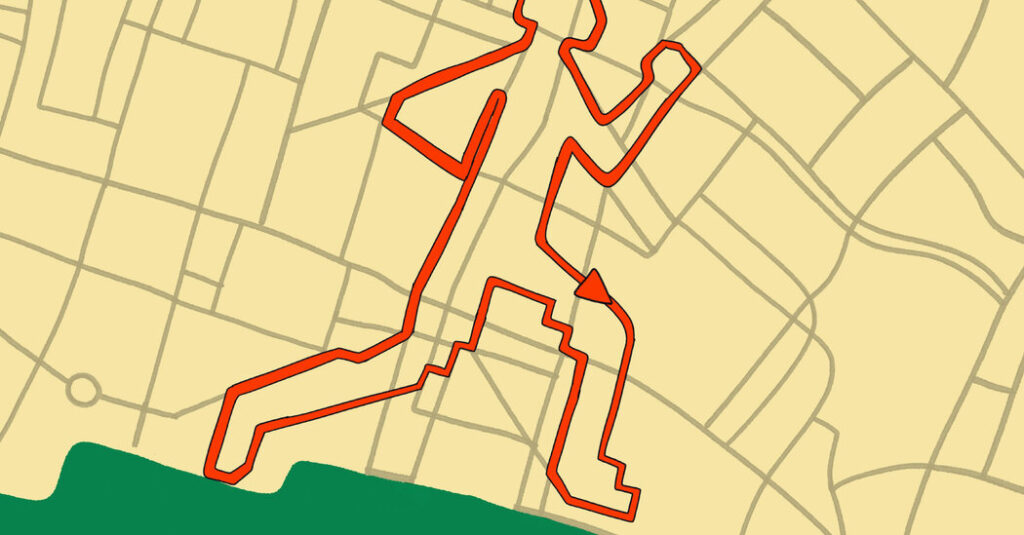On a beautiful fall Friday in Denver, someone named Wyatt stole my Local Legend crown. “There it goes!” chirped an email informing me of the loss of a title I had never cared about until then. I wanted to destroy him.
I didn’t. Instead, I followed him — though not literally. I am one of the more than 150 million runners, cyclists and hikers who use Strava, an app that logs your exercise activity and lets you compare it with that of other people.
I began running in March 2020, when cities closed rec centers and eerily removed the outdoor basketball hoops that had been my preferred form of exercise since I was a teenager. To keep in shape, I ran a mile, then three, then five, 10, 13. It was a peaceful escape from the ferocity of team sports. I prioritized isolation in the pandemic, running solo past tent cities and train tracks. Strava helpfully logged my speed, distance and route, displaying curvy orange lines on tiny maps, often flashing personal-record emoji medals and “nicely done!” messages. In lieu of human contact, these robotic adrenaline boosts became addictive.
At first, I used Strava’s social features sparingly, limiting followers to a few real-life friends (like Max, who cycles 6.79 miles to work each day and is generous with the “kudos,” Strava’s version of “likes”). But the more I ran, the more inspiration I found in following strangers — like Greg, a Ukrainian runner braving the threat of Russian bombs, and Keira, an elite Utah marathoner racing around the world.
When the pandemic let up, I started on a new path around Sloan’s Lake, a flat, 2.6-mile paved loop in view of Denver’s downtown skyline and the Rocky Mountain foothills. It was bustling with families, dog-walkers, cyclists. Craving community, I ran a 10K around the lake each Monday and a half-marathon each Saturday, using the app’s performance analytics to improve both my stamina and speed.
“Nicely done! You’re the Local Legend!” Strava told me one day in an unsolicited email. This designation, it turned out, rewards users who run the same route most frequently over the course of 90 days. It didn’t mean I was particularly fast. Or durable. But I was great at routine. I puffed up my chest around Sloan’s Lake. Hello, I imagined telling the poodle on the long leash. I’m your Local Legend.
A few days later, though, somebody named Jenn “nabbed” (Strava’s own word) my title. One long run later, after I regained my status, a person named Cameron stole it again. Then came Wyatt.
Scrolling through this stranger’s Strava profile, I learned Wyatt runs almost every day, often earlier than 5 a.m., about 20 or 30 seconds faster than me per mile, roughly 40 miles every week. He zigzags around highways, neighborhoods and strip malls — and like me, he frequently traversed the same lakeside loop, enough times to filch my Local Legend record again and again.
I felt the same pang of jealousy as when an acquaintance appears impossibly fit in a photo online, or when a former classmate writes a book that seems more interesting than mine. I’m not proud of how prone I am to destructive competition — how, when someone cuts me off in traffic, my instinct is to weave through and regain the lead — but I was determined to run more loops. I even drove the mile and a half from my house, rather than running there, to maximize my total Strava mileage around the lake. Instead of one loop on Mondays, I ran two or three.
We all know social media is artificial, and Instagram and Facebook are full of flattering selfies and strategically subtle brags. But Strava, by building rankings on hard biometric data collected by phones and watches — as opposed to a carefully curated set of photos, videos or hot takes — feels like the rare social-media app that makes you tell the truth. (There are technically ways to hack the map files, but I would guess a majority of people aren’t downloading special software to transform themselves into Usain Bolt.) This data meritocracy creates a sense that you are being measured against something concrete and real.
But my efforts didn’t work. Not only were strangers continually besting me, I was also burning out — from the running and the same views of trees and geese.
Feeling stuck and seeking inspiration, I started researching my rivals. I learned Jenn alternates between the lake path and city streets, bending the orange lines on her maps into curlicues. Cameron intersperses his lake runs with hikes and bike rides across the state. And Wyatt seems to be using his Sloan’s Lake runs to train for a longer route in Utah.
Unlike my neat loops, Wyatt’s runs sprawled jaggedly all across Denver. Then I noticed that Greg’s lines, through urban Lviv, often resembled a paper clip. Over the summer, Max texted me about a mutual friend, Mateo, traveling and exercising in Uzbekistan. I checked Mateo’s Strava. His orange line through the ancient walled city of Khiva looked like a long-tailed tadpole. All these creatively shaped trails, I realized, added up to an international collective of athletes. Sometimes they intersected, coming together around the same loop, looking at the same trees and geese. But they were all on their own paths.
Maybe what I needed was not just community or competition but also exploration. Recently, I tested this theory. Instead of running my orthodox four laps around the lake, I took off in the opposite direction, down the Cherry Creek Trail, a bike path that curves along downtown Denver, ending up in pretty Washington Park. Along the way, I passed a man dancing in and out of the path, moving like Fred Astaire with an imaginary Ginger Rogers. He smiled. I nodded back, and thought: You, sir, are the Local Legend.
Steve Knopper is a Billboard editor at large who is writing a book on ’70s funk music.
The post The Social-Media Platform That Makes You Tell the Truth appeared first on New York Times.




